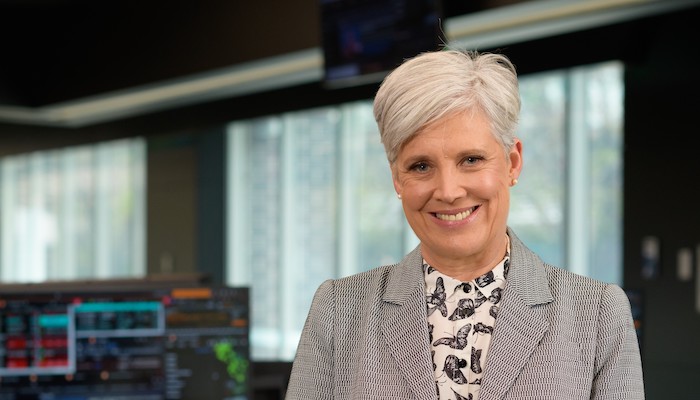New research on the practices of Australian institutional investors found that 87 per cent of those questioned said their decision-making about a company's investment performance was strongly impacted by its environmental, social and governance (ESG) principles.

ESG principles reign: Research shows institutional investors want to tackle the practice of greenwashing, where firms mislead investors about thier environmental performance.
"These Australian super funds take ESG very seriously," says Professor Elizabeth Sheedy, from Macquarie's Department of Applied Finance, who co-authored the report with postgraduate researcher Vincent McGrath.
"Encouragingly, what we observed seems very genuine and, despite broader cynicism about the ESG industry, it shows we have come a long way in a short space of time."
The whitepaper, entitled Under the Hood of ESG Investing by McGrath and Sheedy, was published by the Centre for Corporate Sustainability and Environmental Finance at Macquarie University's Business School.
It was based on interviews with more than two dozen Australian institutional investors in 2021–22, including superannuation funds, asset managers, and advisory firms.
"We wanted to know what the motivation was for investors who prioritised ESG principles in their investing, how they did it and what their response was in relation to greenwashing," says McGrath.
McGrath says ESG is one of the most noticeable investment trends of the last decade, and responsible investing in Australia has grown from 16 per cent of total assets under management in 2013, to an estimated 43 per cent in 2022.
Behind the greenwashing veil
Investor greenwashing can occur when firms and asset managers use selective or vague disclosures, overstating and misleading investors about their environmental performance.
McGrath says interviewees adopt different methods to "get behind the greenwashing veil". One advisor said they compare peer practices, and a company with a vague climate policy will be rated far lower than a company that lists audited emissions data, has set a net-zero target, and a plan to get there.

Blue-sky thinking: The new Macquarie Business School research aimed to learn how institutional investors respond to greenwashing.
Another asset manager gave the example of a large oil and gas company that claimed grand de-carbonisation plans which were assessed by the asset manager's ESG team.
The ESG team crunched some numbers on the gas company's plans to purchase carbon offsets, finding these – if followed through – would swallow the entire profit of the business.
"Australian institutional investors really go to considerable lengths to overcome potential greenwashing. They see it as a real risk to investment performance if a company isn't living up to their claims, and as a potential threat to investor reputation," says McGrath.
Investment utopia
Australia's 3.3 trillion-dollar superannuation industry means that institutional investors have a unique ability to engage with firms, the research found.
More than two-thirds of investors in the survey (67.7 per cent) stated that growing client and/or stakeholder demand pushed them to assess ESG principles.
In comparison, just one third (33.1 per cent) of international investors surveyed in a report published in 2018 in the Financial Analysts' Journal, said their clients wanted ESG assessed during investment decisions.
The most important reason for the ESG focus by Australia's super funds, however, is the belief that it leads to better investment performance and ultimately to better retirement outcomes for members.
There are different schools of thought around whether responsible investing means walking away from companies such as fossil fuel producers, or whether you stay invested and make an impact by trying to change the practices of companies with problems.
"Superannuation funds are very large and powerful in Australia's relatively small market, but they are also influenced by wider society opinions as they ultimately report back to all working Australians, because of compulsory super," says McGrath.
As a result, McGrath says that the vast majority of Australian superannuation funds include ESG options. "Interviewees told us that they respond to client demand – and that means there is a reputational risk for firms who choose not to engage in ESG."

A numbers game... The study showed asset managers believe ESG investment is a key driver of value.
One investment advisor quoted in the report said investor peers in the US and other markets "look at Australia as some sort of utopia of engagement between companies and investors".
Australia is described as an engagement utopia because of the scale of large super funds and their ability to coordinate their engagement efforts, McGrath says.
Impact investing
The report found that most survey participants use ESG information to engage with companies they invest in, and they are 'active owners' who focus on changing the practices of companies rather than excluding them from their portfolios.

Professor Elizabeth Sheedy, pictured, found 42 per cent of research participants saw ESG as an ethical responsibility. Image credit: Jesse Taylor
Sheedy says the point about Australia being an engagement utopia was a lightbulb moment for her.
"There are different schools of thought around whether responsible investing means walking away from companies such as fossil fuel producers, or whether you stay invested and make an impact by trying to change the practices of companies with problems," she explains.
'Impact investing' is a common approach among Australian institutional investors, she adds, and that's partly because these investors are powerful (because they are the largest in the market) and are accountable to a broad audience through compulsory superannuation.

Researcher Vincent McGrath, pictured, says ESG is one of the most noticeable investment trends of the last decade. Image credit: Jesse Taylor.
Sheedy adds that responsible investors that can change practices in such companies, can generally bring about a better outcome for society overall.
A recent example involves AGL – Australia's largest private energy producer – where ESG-focused investors are pushing the company to accelerate its closure of high-polluting coal-fired power stations.
This research gives insights into the changing nature of Australian institutional investment, she adds.
"We rarely hear about institutional investors making a difference to company policies through their engagement, because this is typically done behind the scenes," Sheedy says.
Professor Elizabeth Sheedy is a risk governance expert based in the Department of Applied Finance in the Macquarie Business School.
PhD student Vincent McGrath is at Macquarie University in the Department of Applied Finance with a particular interest in institutional investors.






